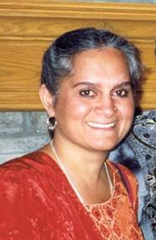
The South Asian community has been in Canada for more than 100 years, has fought against exclusion and eventually got the right to vote in 1947. Yet South Asians continue to face a lot of racial discrimination in the economy, and the media continues to construct them as outsiders to the Canadian nation, according to Dr. Sunera Thobani, an associate professor at the University of British Columbia.
And too often, the diversity within the South Asian community can be glossed over by the media, or worse, sharpened as a wedge that drives destructive divisions, she says.
Thobani has organized a week-long series of events, starting today, to commemorate a century of South Asian presence in Canada.
The event will also mark the anniversary of the Continuous Journey Act, which Thobani said was introduced by the Canadian government, of the time, to specifically stop South Asian migration to Canada.
Under the Continuous Journey regulation of 1908, ships could not enter Canada if they had to stop and refuel from the originating destination. It wasn't possible to reach Canada from India without stopping to refuel in those days. In 1914, scores of Indians -- British subjects of that time -- travelling on board the Japanese ship, Komagata Maru, were denied entry into Canada after a two-month standoff at the Vancouver port.
Marking the presence [of South Asians] is very important because it speaks to the history of resistance, and to the history of struggles to be accepted as full citizens and to have rights to entitlement in this country, said Thobani.
Creating space to start a conversation
Criticizing Canada's immigration and multicultural policies, Thobani said South Asians are still fighting for full rights and entitlements in Canada, and the week-long event would help create a space where the community can come together to start a dialogue to address some of the challenges.
Among the events are many film showings and discussions dealing with racism and discriminatory policies against South Asians in Canada.
On Friday, Toronto Grade 10 student Kabir Joshi-Vijayan will give a keynote talk on the "The Myth of the Model Immigrant." Joshi-Vijayan is a coordinator of the Toronto Haiti Action Committee, and also a co-producer and co-host of a radio program.
The events will offer a platform to highlight research done on the South Asian community, recognize the community's culture and heritage through performances, initiate a dialogue to address the media representations of the community and to understand some of the challenges the community faced in the past through screenings of films made on the subject.
Some of the events will cater specifically to the children. "It's very important for children to get a sense of pride in their identity," said Dr. Thobani, who feels that the community continues to be seen and treated as "second-class." This stems from the identity of being classified as an immigrant, according to Dr. Thobani.
"I think immigrant is a racialized category," said Dr. Thobani, who says that even though there are second and third-generation South Asians in Canada, most of the community members get lumped in this category, and treated like outsiders. As a result, the community doesn't get the attention it deserves, which in turn fails to get any kind of commitment from the state.
'An incredibly diverse community'
The other problem associated with identity and classification is the failure to recognize the diversity within the South Asian community, according to Dr. Thobani. "[South Asians] end up being constructed as a homogenous community with all having the same needs and yet, we are an incredibly diverse community," she said.
As a result, the differences of experiences within the community get erased. "[South Asians] should use the diversity as a strength, rather than be pitched against each other, as sometimes the politics of multiculturalism encourages," said Dr. Thobani.
She feels that by creating a community dialogue, [South Asians] can see their own responsibility for transforming the politics of the community. "Collective solutions can be found only through community dialogue," said Dr. Thobani.
Dr. Thobani also stressed the importance of recognizing the Aboriginal community, whose land we all use. "It's really important that we have a dialogue in this country that builds solidarity between the South Asians and the Aboriginal people, because they are still struggling for their rights," she said.
Speaking Friday along with Joshi-Vijayan will be Dustin Rivers, a Skwxwú7mesh (Squamish) youth writer and artist in search of authentic indigenous ways to create lasting change and decolonization for his people. He has worked at Redwire Native Youth Media and is featured in the film Olympiad on the impact of the 2010 Olympics on indigenous peoples.
Thobani said that South Asians and the Aboriginal community have both been racialized in different ways, and by helping end racial discrimination towards other communities, the South Asian community can help end discrimination towards itself.
The events are open to all members of the public from all communities. For more information, visit http://southasianevents.blogspot.com.
Related Tyee stories:
- Facing Terror
Interview with Can You Hear the Nightbird Call? Author Anita Rau Badami - Keep Out!
New doc on Komagata Maru puts the lie to a welcoming Canada. - Saying Sorry Isn't Enough
Komagata Maru and the politics of official apologies.
Read more: Rights + Justice














Tyee Commenting Guidelines
Comments that violate guidelines risk being deleted, and violations may result in a temporary or permanent user ban. Maintain the spirit of good conversation to stay in the discussion.
*Please note The Tyee is not a forum for spreading misinformation about COVID-19, denying its existence or minimizing its risk to public health.
Do:
Do not: